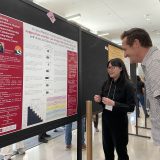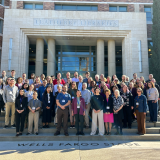Math/CS Research Seminars: Oct 21 and 24
October 17, 2014
Join us for two upcoming math and computational science research seminars October 21 and 24 in Von Neumann Hall.
Speaker: Prof. Daniel Alpay, Ben-Gurion University of the Negev, Israel
Tuesday October 21st 2014 at 4pm (tea and cookies at 3:30pm)
in Von Neumann Hall
Title: Linear combination interpolation, Cuntz relations and infinite products (joint work with I. Lewkowicz, P. Jorgensen and D. Volok)
Abstract: We introduce the following linear combination interpolation problem:
Given N distinct numbers w_1,…, w_N and N+1 complex numbers a_1,…, a_N and c, find all functions f(z) analytic in a simply connected set (depending on f) containing the points w_1,…,w_N such that \sum_{u=1}^N a_u f(w_u)=c. To this end we prove a representation theorem for such functions f in terms of an associated polynomial p(z). We first introduce the following two operations, substitution of p, and multiplication by monomials z^j , 0<= j < N. Then let M be the module generated by these two operations, acting on functions analytic near 0. We prove that every function f, analytic in a neighborhood of the roots of p , is in M. In fact, this representation of f is unique. To solve the above interpolation problem, we employ an adapted systems theoretic realization, as well as an associated representation of the Cuntz relations (from multi-variable operator theory.) We study these operations in reproducing kernel Hilbert space): We give necessary and sufficient condition for existence of realizations of these representation of the Cuntz relations by operators in certain reproducing kernel Hilbert spaces, and offer infinite product factorizations of the corresponding kernels.
Speaker: Dr. Brendan Fahy, Postdoctoral Fellow, KEK High Energy Research Organization, Tsukuba, JapanTBA
Friday October 24th 2014 at 12:30 p.m. (tea and cookies at noon)
in Von Neumann Hall
Title: Applications of the stochastic LapH method in lattice QCD
Abstract: Calculating observable quantities in QCD at low energies requires a non-perturbative approach. Lattice QCD is a non-perturbative solution which quantities can be estimates using Monte Carlo methods. However many quantities such as multi-hadron operators require large amounts of computational power to compute. Using the stochastic LapH method the costly matrix inverses required are estimated rather than computed exactly drastically reducing the computational costs. These modern computation techniques allow for the computation of a large number of operators including multi-hadron operators. Results of the spectrum of energies for the lowest 50 bound states in a finite box are presented for the rho-meson channel.

